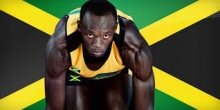Exporting Jamaican Sports via Television
Exporting Jamaican Sports via Television

Creating TV Content for Export
Some years ago as the General Manager of Television Jamaica (TVJ) a senior technocrat told me that news did not count as a local TV programme. I was aghast. News, in particular the 7pm Prime Time News, was TVJ’s flagship programme and pulled substantially on the station’s entire budget of expenditures. Admittedly, about sixty percent of the station’s revenue at that time was derived from the prime time news hour, a one hour block of time that included sports.
Having determined that the creation of local content was one key differentiating feature of TVJ, quickly branded as ‘The Nation’s Station’, and that news was a marker for station differentiation, much of my energy was directed toward improving the news product. Note carefully that my definition of news always included sports news.
New products such as News at 10 (brought into being through the kind assistance of Jim Malcolm formerly of the British High Commission who worked with the BBC to allow TVJ free use of its content in that newscast) and Mid Day News (driven by Journalist Carol Francis), along with a “beefing up” of the 7 PM – 8 PM product by way of features such as Business Report/Business News and Sports Commentary, led to an improvement of the station’s profile, market leadership and revenues.
Transporting for Export
Local news and sports were packed to hard tapes and sent weekly via courier service to a cable channel, CIN, which distributed to the Jamaican Diaspora in the tri-state area of the USA. We also packaged for Canada and the Caribbean. So committed were we to content creation, distribution and export that by the year 2000 for the first time TVJ and Jamaica won the coveted recognition and award of ‘Broadcaster of the Year’ for the Caribbean, bestowed by the Caribbean Broadcasting Union (CBU).
At that time, the station was exporting about five and a half hours weekly but all via hard tapes and courier. It was not easy! Still, the vision for programme export from Jamaica and for telling our own stories in our authentic voices was stronger than the inconveniences related to achieving this.
‘Exports will be Transmitted not Transported’
Fast forward ten years. My vision for programme export from Jamaica has not dampened. Back at the helm beside my son in our 30 year old business, a television and multi-media content creation and distribution company with web-streaming services, the truth of a HSBC sign at a boarding gate in Miami rings clear.
“Exports will be transmitted, not transported”. One of my tweeps @DalvbeyG sent me a picture of the sign in response to a series of tweets I posted promoting Live Streaming of the upcoming National Senior Trials in Jamaica, June 20 to 23, via Trackandfieldja.com.
The Internet and mobile technologies such as Tablets and Mobile Phones have been game-changers in the concept of programme export. No longer do those of us, including TV stations in Jamaica, unable to afford space segments on geostationary satellites have to struggle with physical tapes via couriers to get our content exported.
We can stream via the Internet and make our TV programmes available on a variety of mobile platforms. This is the plan for the National Trials where Usain Bolt is scheduled to run on every day of the four day event in order to defend his title and to qualify for the Moscow World Championships this August. Undoubtedly, Jamaicans in the Diaspora and many others will want to witness this, especially given Bolt’s recent loss to Gatlin.
Sports TV as Product Export
Coming back to exporting content via satellite, don’t get me wrong, while Internet streaming is growing in value and appeal, the “Big Boys’ in broadcasting continue to rely heavily on satellites. Recently the east side of the National Stadium of Jamaica was a veritable ‘dish farm’ as foreign TV networks descended on the ‘rock’ to cover the World Cup Qualifiers.
Phase Three provided full logistical support, crew and production services along with High Definition cameras and other equipment to facilitate the foreign broadcasters. Traffic Sports, Telemundo, Tele Visia, TV Azteca and be In Sport were highly complimentary of the services and the timeliness with which things got done. They were impressed with the decided absence of a ‘Jamaica time’ mentality. After all, punctuality is one sine quo non of Live TV.
Jamaican TV to the World
Reports are that the TV signal for the Jamaica versus Mexico match was beamed to a potential TV audience of well over two hundred million. This is highly believable given that the countries that received the signal included Brazil, Mexico, the USA, UK and other parts of Europe as well as countries in Africa. Many of them have massive football-loving populations. Then too, Telemundo, owned by NBC Universal, is said to have over 200 TV stations across the United States of America.
No one can convincingly argue against Jamaica’s comparative advantage in sports such as track and field. Sports TV is therefore a viable avenue for investment and export. As Jamaica positions itself to be a logistics hub, digital connectivity is one cornerstone.
Remember the expression ‘Digital Superhighway’? It’s really here and it truly is a disruptive technology in terms of how we do business. This is absolutely true in many respects and not only for television, ‘exports will be transmitted (and) not transported’. ‘Beam me up Scotty’ or stream me live.


